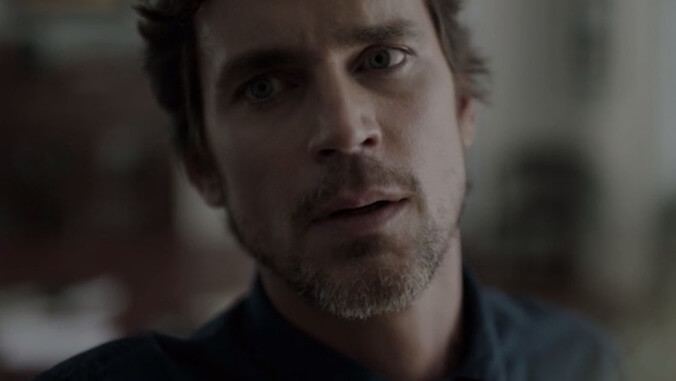In its second episode, The Sinner starts to get weird


“Strange, isn’t it? That some letter should determine your fate?” Jamie Burns says this to his student, while she protests his undercutting of the college recommendation letter she wrote for herself, but it’s also a clear (and ominous) foreshadowing regarding the destruction Jamie wreaked in his own life by inviting Nick Haas back into it. He sent his old friend an email, and if Nick’s admonitions are any indication, Jamie knew full well the kind of response he would provoke by contacting his old buddy after 18 years of radio silence. He can feel the pressure from police, from his wife, from his boss—but at least he’s feeling something. Because, as he tells Nick, the lack of emotion was what precipitated this whole tragedy: “I don’t feel anything anymore.”
The second episode of the season has started to dig into what makes Nick and Jamie’s relationship so unusual, but it still feels a bit pedestrian after the last two installments of this series. It’s looking more and more like the two college pals had some sort of deeply intimate routines involving violence, injury, and/or risking death in a variety of ways, like a suicide cult of two that just never went through with it. Instead, they fed off the adrenaline rush that came from self-abuse, whether it’s Nick guiding Jamie’s knife right through his hand when they’re out at dinner, or both of them standing on the edge of a tall Manhattan building, looking down at the ground far below and soaking up the fraught exhilaration of the moment. “You missed this. Admit it,” Nick tells Jamie, and given his former friend is standing right there next to him, tempting fate or a strong gust of wind to splatter him on the street below, it’s hard to deny Nick is probably right.
Luckily, the show is simultaneously working to complicate this narrative, insuring Jamie’s story isn’t some facile account of a guy who essentially went into a holding pattern for much of the previous two decades. Instead, Jamie seems conflicted, in more ways than one. When Harry gently prods him to open up about his friendship with Nick (over some good old-fashioned post hole digging), Jamie asks the detective if he’s ever had someone in his life that was “totally exciting…but was bad for you?” There are things about his new life that Jamie seems to really love—his wife, his job—but it’s in constant flux with his sense of loss, a void at the heart of him that clearly misses the life-or-death intensity of what came before. His ambivalence feels honest—who hasn’t gotten involved with someone who pushed them in negative ways, yet wanted to go back for more?—and it grounds the extreme nature of the case. The pair’s friendship is based in a realistic and relatable dependency, even if it’s less alluring (and less appealingly unknown) than, say, a cult, or a country-club dungeon.
Of course, that’s all before Jamie becomes an attempted murderer. (At least, in relation to strangers; Nick’s death is already on his hands.) By the end of the episode, he’s returned to the hospice-care wing of the hospital where he was treated after passing out during dinner, fastened his hands around the neck of a friendly old guy suffering from dementia, and tried to choke the life out of the bed-bound man. Not before he pours the gentleman a shot of whiskey, of course, and listens to him talk about the strange, ethereal nature of his mindset. (“I can see through the ceiling,” the man tells him, and Jamie immediately wants to know what he glimpses.) Is this Jamie returning to something he gave up long ago, or is it a new compulsion brought about by watching his old friend die? Given he sees Nick in the corner, turning up the volume on a ripped-out car radio, either scenario is possible. Presumably, we’ll know soon enough.
Season three of The Sinner might be the first time I’ve seen Chris Messina’s seemingly boundless charisma put to such darkly magnetic ends. His Nick is an absorbing case study in thwarted desires and pent-up aggression. We don’t know exactly what he means when he gestures to the fancy restaurant in which he’s sitting and tells Jamie, “Places like this keep my head clear,” but we can imagine all sorts of worrying implications. When he subsequently gets up and dumps the cell phones from a neighboring table into their water glasses, it’s almost a relief he didn’t do worse. Messina makes Nick someone so fearsome yet intriguing, it’s all too possible to imagine his specter haunting Jamie after his death, ready to plunge an (illusory) knife into the knee of the arrogant father of Jamie’s student.
But while Jamie starts to unravel, Harry finds himself unexpectedly drawn to Jessica Hecht’s Sonya. Here’s a woman who starts the episode scorning Ambrose and the other cops’ inability to do anything about Jamie coming back onto her property, but soon is sitting in a diner, sharing the story of her stalker with Harry as a way to explain why her worry can so quickly turn to anger. I’d be worried, too: The next day, she finds a grave dug in the wooded land outside her home. Jamie denies digging it, and Harry finds one of Nick’s fortune tellers in the pocket of the coat draped over the shovel. The two of them may be in the dark about the purpose of Nick and Jamie’s late-night visit (or maybe not; it’s hard to tell yet if Sonya knows more than she’s letting on), but it’s looking like maybe Jamie’s bloodlust was shared by Nick, and his friend had set up an efficient little scene for a midnight murder.
Again, it’s too early to know where all this will go, but there are some clear indicators of where it’s headed. It lacks the ambitious scope of earlier seasons, but Messina and Bomer make for a compelling one-two punch of damaged men spiraling into the abyss. Leela is right to call out her husband’s erratic behavior as scary; the further he withdraws into his own head, the more his life unravels around him. “Death isn’t going away,” he tells his friends at dinner. It seems Jamie is determined to bring it closer much faster than anyone—including him—expected.
Stray observations
- The song playing at the end, as ghost-Nick watches Jamie try to strangle the old man, is “Come To Me Now” by Kevin Morby. It includes the lyric, “Where do you go, boy, when you die? Is it pretty and slow? Is it up real high?”
- No host at a Manhattan restaurant wants to make the hour-plus trip to Dorchester.
- Up until now, Jamie has stayed on an even keel with his wife, assuaging her fears and acting as a calming presence when he’s alone with her. That changes here. “Snap out of it? Fit back into my mold?” he spits at her, when she says he’s scaring her.
- Messina really makes the most of even little moments, such as when Jamie holds out his hand to Nick at the restaurant when they reconnect after so many years apart, and Nick rejects it: “C’mon man—we’re not doing that.”
- Nick says there’s nothing to do after climbing to the top of the mountain other than jump off. Reassuring for those of us who will forever be stuck at the base camp of economic life.
- The Sinner, providing a friendly reminder that parents who send their kids to expensive private high schools are almost always assholes.